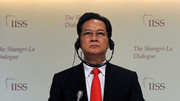Dung Passes Confidence Vote as Vietnam Economic Growth Slows

Nguyen Tan Dung, Vietnam's prime minister, faced a call for a confidence vote in the assembly in late 2010 for his handling of Vietnam Shipbuilding Industry Group, or Vinashin, the state-run firm that he championed and that almost collapsed under $4 billion of debt that year. Photographer: Roslan Rahman/AFP/Getty Images
Vietnam’s prime minister secured enough support from parliament during the communist country’s first confidence vote to keep his job, with almost a third of lawmakers rating him poorly as economic growth stagnates.
Nguyen Tan Dung had support from 67 percent of National Assembly members, the legislature announced in Hanoi today. Thirty-two percent of lawmakers gave him a “low-confidence” ranking. Central bank Governor Nguyen Van Binh received the worst report card, with a “low-confidence” vote from 42 percent of lawmakers.
The secret ballots on premier Dung, the country’s president and 45 other senior officials are a bid to boost government accountability. The ruling Communist Party faces pressure for not curtailing corruption as the economy grew at the slowest pace in 13 years in 2012. Earlier this year, a group including former government officials distributed an alternative draft constitution calling for “political competition.”
Yesterday’s confidence vote allowed Dung and Binh to be “chastised” for mismanaging the economy, while legislators avoided triggering a political crisis by leaving them in office, said Roberto Herrera-Lim, New York-based Asia Director at the Eurasia Group. Dung, 63, will probably complete his second term as prime minister, Herrera-Lim said. Dung was re-elected in 2011 for a five-year term.
‘Step Forward’
“They are sending a message,” Herrera-Lim said by phone. “In a system in which the party has dominated so long, to see some of its most powerful politicians being publicly held to account for the mismanaging of the economy is a step forward. If they did not deal with the problems of perceived mismanagement, it would not be socially acceptable to the population and that could ultimately erode their legitimacy.”
The benchmark VN Index dropped 0.5 percent at the close in Ho Chi Minh City. The gauge has surged 26 percent this year, at least 11 percentage points more than any other Southeast Asian benchmark gauge tracked by Bloomberg.
Under the system, a low confidence outcome from more than two-thirds of delegates will bring a no-confidence vote, with a majority required for the dismissal of an official. Officials who receive two consecutive “low confidence” ratings by more than half of lawmakers will face a no-confidence vote, which could lead to their dismissal from office.
Dung received “low-confidence” votes from 160 of the 492 National Assembly members who cast ballots, the third-worst performance among the 47 senior officials under scrutiny. Central bank chief Binh earned a total confidence vote of 57 percent, according to the results announced by the assembly.
Debt Burden
Vietnam targets 5.5 percent economic growth this year, which would be its first period of three straight years of growth below 6 percent since 1988, according to International Monetary Fund data. The government is trying to reform a banking sector burdened with bad debt, which the central bank estimated at 7.8 percent of outstanding loans at the end of last year, and force state-owned companies to become more efficient.
Jonathan London, assistant professor at the City University of Hong Kong’s Department of Asian and International Studies, said the vote results were similar to those that would be found in a “pluralistic political system.”
“It demonstrates that though Vietnam remains an authoritarian polity, its political system is evolving in an encouraging if indeterminate manner,” London said in an e-mail.
Vote Shortcomings
President Truong Tan Sang had a total confidence ranking of 93 percent, with 66 percent of lawmakers expressing “high-confidence” and 27 percent signaling “confidence” in Dung’s political rival. Of the 498 National Assembly members, 492 voted, according to the body’s chairman, Nguyen Sinh Hung, who told legislators that the calculations were based on 498 members. The total votes didn’t add up to 100 percent.
“We still have some shortcomings but as we can see the results have pretty well reflected the situation of the country,” Hung said. “The results showed that delegates have done it objectively.”
Dung faced a call for a confidence vote in the assembly in late 2010 for his handling of Vietnam Shipbuilding Industry Group, or Vinashin, the state-run firm that he championed and that almost collapsed under $4 billion of debt that year. The vote was never held and Dung apologized to the nation in a televised broadcast in October 2012.
Party General Secretary Nguyen Phu Trong also apologized in October last year for “big mistakes” made by the Politburo. The following month, lawmaker Duong Trung Quoc suggested to Dung in a televised legislative session that he start a “culture of resignation.”
To contact Bloomberg News staff for this story: John Boudreau in Hanoi at jboudreau3@bloomberg.net
To contact the editor responsible for this story: Rosalind Mathieson at rmathieson3@bloomberg.net
